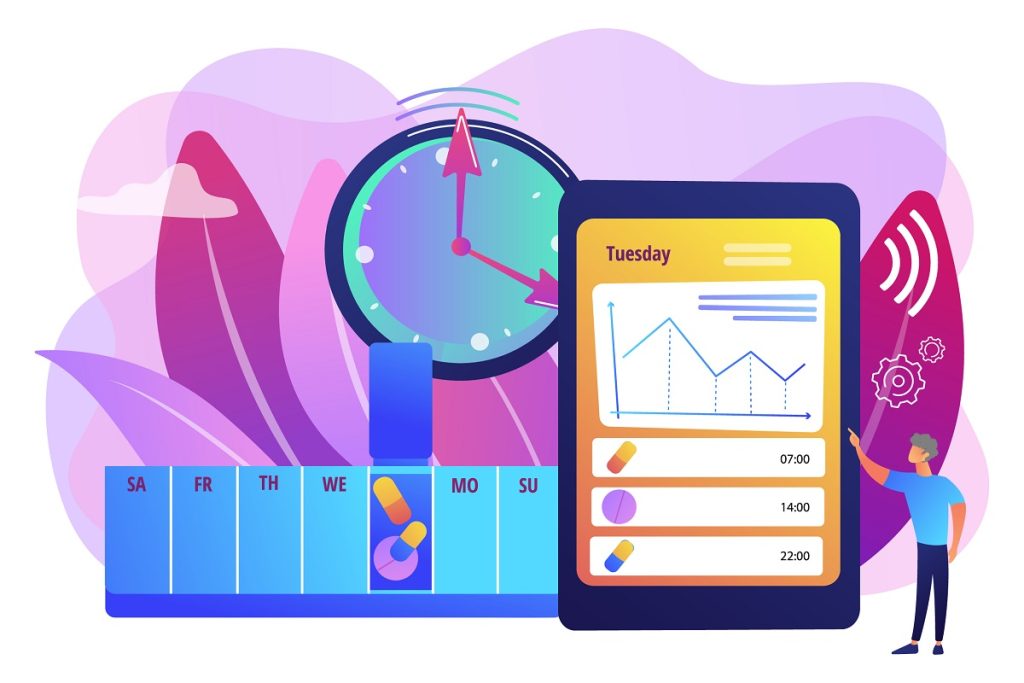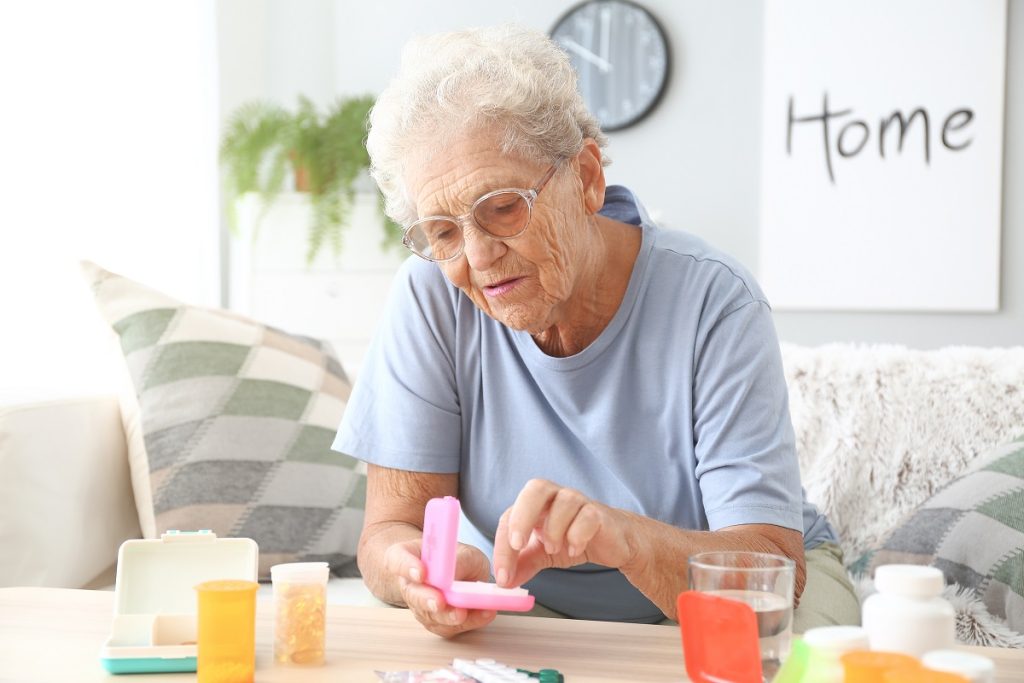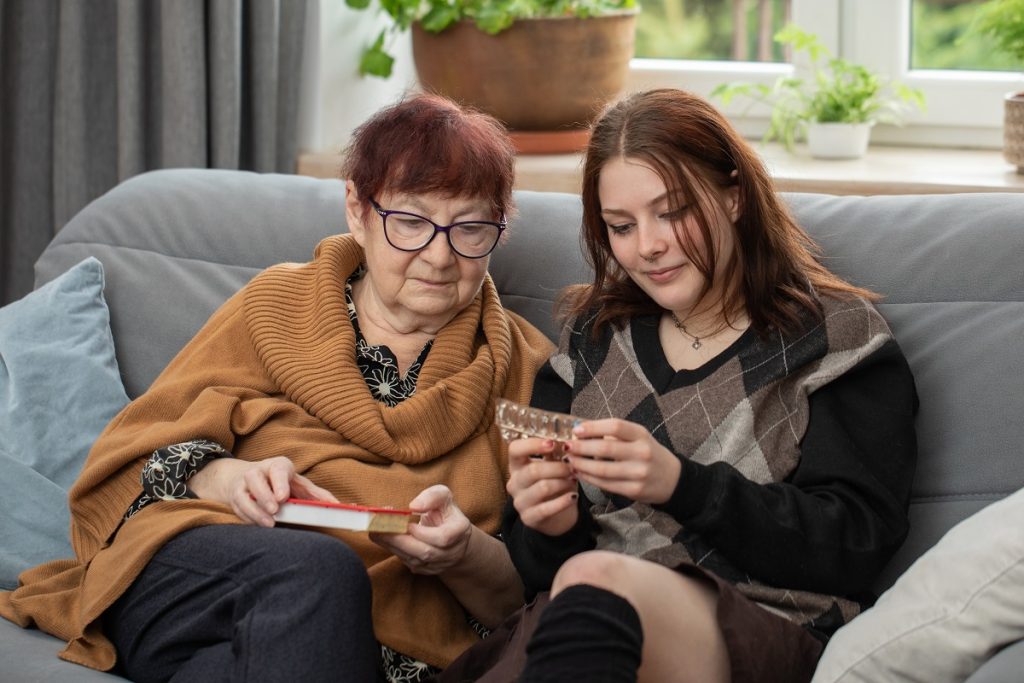Seniors who live alone or who are left by themselves by caretakers may have medications to take during the day. How can seniors or those who look in on them make sure that have medications and hand and remember to take them? The key is organization and setting up a tracking system.
Although adult children of elderly parents cite many things that concern them, worry about their parent’s medication schedule ranks high on the list.
Medication use increases as people age. Couple that with the natural decline of memory that comes with age, and there is reason to worry that your loved one might forget to take medications or not know what to do if they experience adverse side effects or drug interactions.
Fortunately, you can help your loved one navigate taking different medications at the proper times each day without necessarily relying on in-home care.
Why Is Taking Medication On Schedule Important for Seniors?
When taking prescription medications, it is important to take them as prescribed. Healthcare providers count on people taking prescription drugs on the correct timeline and in the correct dosage. This is for many reasons:
- Accurate Dosage: Taking medications on time ensures you have the correct amount of the drug in your body. Some money-strapped seniors skip doses or cut pills in half, but these modifications to the schedule may not get the proper amount of the drug into the system at the optimum interval.
- Effectiveness: The prescribing physician takes the timeline into consideration in order to get the person the optimal impact of the drug.
- Prevent Interactions: Your prescribing physician takes everything into consideration when working on your pharmaceutical regime. That may include timing in order to help prevent adverse drug events.
- Worsening Conditions: Not taking the medications on time can worsen your medical condition.

Why Don’t People Take Their Meds On Time (or at all)?
It is sadly all too common for people either not to take medications on time or not at all. Why does this happen?
- Cognitive Impairment: A person can forget or perhaps not understand how they should be taking their prescriptions.
- Cost: Sometimes, people take their medications less frequently than they should because of the cost of the medication.
- Fear: Many fear the adverse effects and possible side effects of new medications, so they are hesitant to take them (or afraid to take them as frequently as they should).
- Forgetfulness: People can simply forget to take their medications as they are supposed to.
- Lack of Symptoms: Sadly, when the medication regimen is doing the job it is intended to do, sometimes people think that means they are not needed.
- Running Out: Senior citizens sometimes forget to procure drug refills on their medication list until they are completely out.
Why Is Medication Management Important For the Elderly?
You can likely see the importance of medication management after reading just a few short things on the topic. Medication management makes it easier for your loved one to follow the physician’s expectations.
Family members can help put systems in place to be certain that their loved ones are receiving medication reminders, getting refills automatically, and have a reminder system to help them know what to take when.
This might include pill box organizers that lay out the meds daily or weekly for ease in administering them, along with setting up a reminder system.

What Can Older Adults Do To Manage Medications?
- Make Lists: A list can help you organize your medications or serve as reminders of the time of day each medication should be taken.
- Pill Organizers: Using a pill organizer with separate sections for different times of day and days of the week can keep you on track with your medications. Keeping meds all stuffed inside the medicine cabinet is a good way to miss something important.
- Review Medications Regularly: A frequent audit of medications will ensure that a new prescription is not missed. It can also help you find any medications past the expiration dates.
- Set Reminders: Reminders can be on a phone, computer, or even an old-fashioned stove timer to help ensure you take them on time.
- Take Meds to Appointments: Your pill bottles with the prescription labels intact should accompany you to any medical appointments. This includes any over-the-counter medications (OTC) or supplements you regularly take and helps your healthcare professionals verify you don’t have any unwanted interactions between your prescriptions and OTC items.
- Understand each Drug: You should know which health condition or chronic condition each drug is meant to treat. Your doctor can explain why you are taking each, but your pharmacist and online sources can go into more detail.
How Do You Organize Medication For The Elderly?
Whether you are organizing medication for your loved one or as a caregiver part of a care team, the steps are the same.
- Find all prescribed medication.
- Ask the person if they know what each medication is for. If they do not know, make a note to ask at the next doctor’s appointment.
- If you can find the literature included with the medication, check for potential side effects and what to look for in allergic reactions. Call the pharmacy for help if you no longer have the package enclosures.
- Read all of the labels and make lists that lay out what needs to be taken and when. Also, take note if medications need to be taken with food or on an empty stomach, etc.
- Put the medications in an organizer that makes clear sense to the person who needs to take them. Many organizers have four separate spots for different times of the day.
- Set a timer to go off at these important times of the day.
- Plan a set day each week to help the individual review any changes, refill the pill box, and set any alarms.

What Are Some Ways Older People Can Keep Track Of Their Medication?
Need some tools to set up a medication management program?
The two best things you can do are:
- Purchase a pill container with dividers based on the days of the week and time of the day
- Set some type of reminder.

Reminders can be set using technology such as on a smartwatch or smartphone or in the old school manner like the timer on a stove or a special medication alarm. Some pill cases even come with timers.
If you visit your loved one daily, make it a habit to check the pill container to ensure it is being emptied properly. You might replace bottle tops with timed caps for medicine bottles that show when the bottle was last opened. Ensure your family member you are doing this from a perspective of love and concern, not control.
Sometimes people find it helpful to keep a pill calendar. This just means that they write down each dose they have taken. It can be important if you occasionally miss doses because it can help you determine if you are having adverse reactions or side effects as a result.

